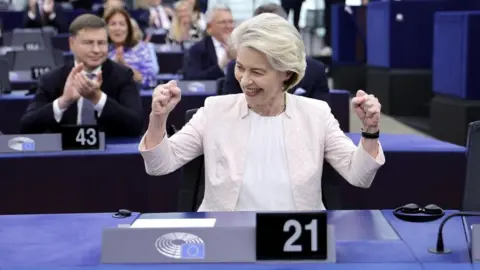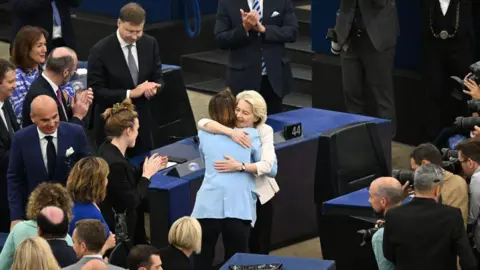Ursula von der Leyen secures five more years top EU job
RONALD WITTEK/EPA-EFE/REX/Shutterstock
Ursula von der Leyen needed to win at least 361 votes in the 720-seat Parliament

Ursula von der Leyen has been re-elected as president of the European Commission following a secret ballot among MEPs.
She secured the backing of 401 Members of the European Parliament at a vote in Strasbourg on Thursday - 41 more than she needed.
Ms von der Leyen, of the centre-right European People’s Party (EPP), was first elected in 2019.
She will now serve another five years at the helm of the EU.
“You can imagine this is a very emotional and special moment for me,” she said after the vote, hailing the result as a sign of strong confidence.
Speaking to reporters, she added that the most important thing for Europe was to defend its democracy "which is under attack from inside and from outside".
Her remarks echoed a speech to MEPs earlier on Thursday, in which she spoke out against what she called the "demagogues and extremists" that "destroy our European way of life" and promised to collaborate with "all the democratic forces" in the Parliament.
Ahead of the vote, Ms von der Leyen also said she would champion European defence with increased military spending, and committed to sticking to climate targets.
"The last five years have shown what we can do together. Let us do it again. Let us make the choice of strength," she said.

Ms von der Leyen's nomination was approved at an EU leaders' summit last month, although not all of them backed her.
There was immediate praise for her re-election from Germany's Olaf Scholz, who said it was a "clear sign of our ability to act in the European Union, especially in difficult times".
Dutch Prime Minister Dick Schoof said it was good that Europe could "count on your knowledge, experience and leadership in these times of great challenges", while French President Emmanuel Macron hailed Ms von der Leyen's re-election "for a more sovereign, more competitive and more democratic Europe".
Dursun Aydemir/Anadolu
Ms von der Leyen was congratulated in the Parliament after winning the vote
Beyond the EU, UK Prime Minister Keir Starmer said he looked forward to "working closely" with Ms von der Leyen.
As head of the EU's executive branch, the president of the European Commission sets the EU's policy agenda, political direction and priorities, leads a cabinet of commissioners and represents the EU at international meetings and summits.
The other two big EU jobs will be filled later this year by António Costa, a former Socialist prime minister in Portugal, who will head the European Council, which represents the 27 EU governments; and by Estonia’s Kaja Kallas who has stepped down as prime minister to become the EU’s foreign policy chief.

Before Thursday's vote Ms von der Leyen succeeded in winning the support of her own centre-right European People’s Party (EPP), the Socialist & Democrats, the liberal Renew and Greens, but not all of their members backed her.
She acknowledged that the Greens had played an instrumental role in securing a majority, saying she was "very grateful" for their support.
Ms von der Leyen was opposed by 284 MEPs.
Far-right groupings, including the biggest and newly formed Patriots for Europe, were vehemently against her winning a second term.
Members of Prime Minister Giorgia Meloni far-right Brothers of Italy (FdI) party revealed they had not supported Ms von der Leyen.
"Voting for her would have meant going against our principles," said FdI MEP Nicola Procaccini.
Ms Meloni, who at times has appeared close to Ms von der Leyen, has become increasingly lukewarm about her in recent weeks.
In June, she voiced her discontent at the exclusion of her right-wing European Conservatives and Reformists (ECR) group from a discussion among EU leaders on who should be awarded the EU's top jobs.
She later abstained from the vote on Ms von der Leyen's nomination.
The Commission president did not respond directly when asked by reporters about the loss of support from Meloni-affiliated MEPs.
However, she said the result showed she had been right to focus on "bundling the democratic forces together" and to offer to work together with "all those who are pro-Europe, pro-Ukraine and pro-rule of law".
Addressing the prospect of a potential Donald Trump victory in November's US presidential election, which could usher in a less Europe-friendly White House, Ms von der Leyen said that the EU's "dependencies" needed to be reduced.
"We will work with friends and allies but... we are also building our own strength," she said.























































